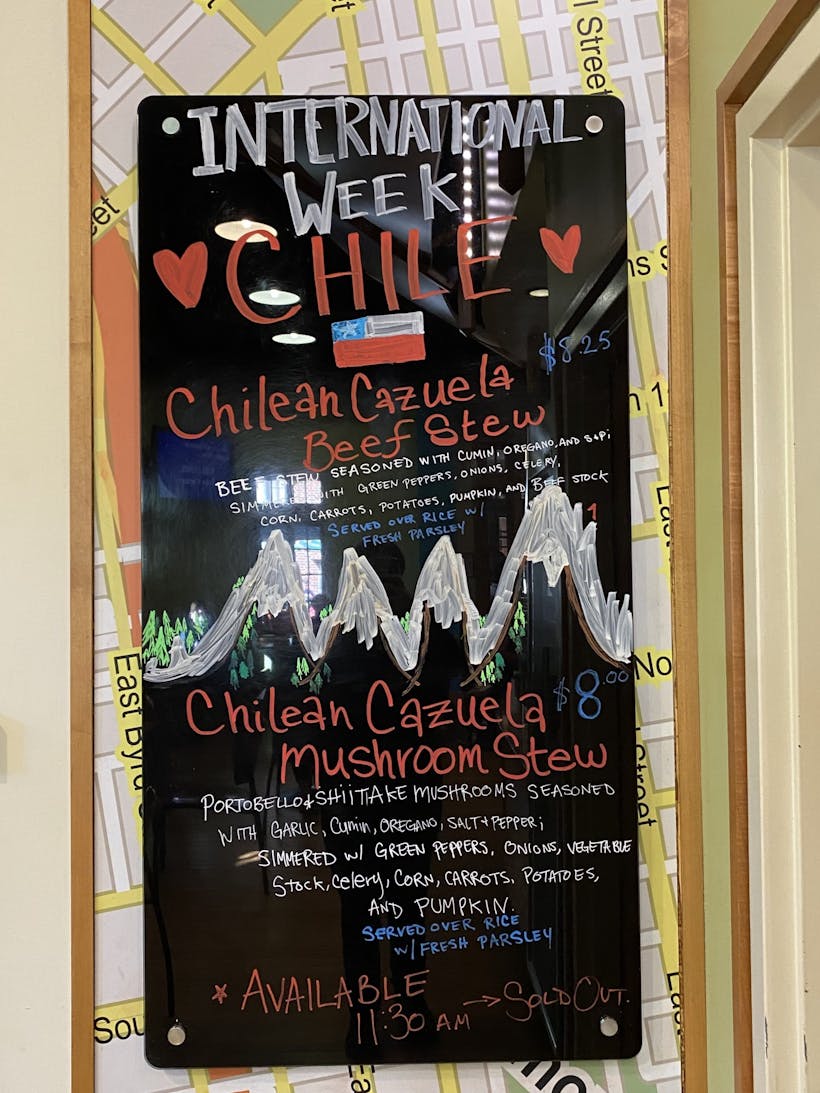Editor’s Note: The views and opinions expressed in this article do not reflect those of The Collegian.
The University of Richmond’s Office of International Education focused this year's International Education Week on Chile, and Passport Cafe served a Chilean dish as their special for the week. The meat option was the Chilean Cazuela Beef Stew and the vegetarian option was the Chilean Cazuela Mushroom Stew. My friend, sophomore Makenna Gitobu, told me that she had also tried the beef dish, so I’ve included her thoughts on the dishes in this review as well. The Passport sign described the ingredients in both dishes. The mushroom stew, priced at $8.00, contained “Portobello and shiitake mushrooms seasoned with garlic, cumin, oregano, salt & pepper; simmered with green peppers, onions, celery, corn, carrots, potatoes, pumpkin, and vegetable stock; served over rice with fresh parsley.” The beef stew, priced at $9.25, contained "Beef stew seasoned with garlic, cumin, oregano, salt & pepper; simmered with green peppers, onions, celery, corn, carrots, potatoes, pumpkin, and beef stock; served over rice with fresh parsley.”

I headed over to Passport to try the dish and ordered both the meat and the vegetarian option, much to the dismay of my dining dollars. Recently, I have been trying to lower my meat consumption, so I was really interested in comparing the two options at Passport. Particularly since last time I tried their specials, I discovered how lackluster the vegetarian option was.
My orders came in circular plastic tupperware instead of Passport’s typical cardboard containers. When I opened them, I was immediately struck by the strong scent of parsley. The stews were not mixed, with the rice on top and the other ingredients sitting at the bottom, so I went ahead and mixed them together. I wanted to try the vegetarian option first since I had not eaten meat in days, and I wanted my palette to be completely free of meat so I could give the vegetables my full attention.

The first thing I noticed was that the consistency resembled that of a soup, despite Passport’s description of the dish as a stew. The strong taste of cumin -- a staple in the cuisine I grew up with -- gave me a sense of familiarity upon my very first bite. Initially, I had trouble finding any mushrooms in the dish. When I did find a few, I noticed that they were cut in very large pieces. Since the intention of the vegetarian dish seemed to be to use mushrooms as a meat substitute, I expected more of them in bite-sized shapes to mimic the effect of eating meat. Additionally, the mushrooms themselves were not very flavorful. There was the slight earthy hint that mushrooms generally have, but it did not feel like they were spiced at all. Overall, the dish had a very warm aroma. The spices -- though light -- still came through in every bite.
I then moved onto the meat dish. The first piece of meat that I tried was all cartilage, which was a disappointing surprise. I have pretty sensitive teeth, so biting down on that tough piece sent a wave of shock through me. The rest of the pieces were amazing. They were incredibly tender, juicy and full of flavor. This dish felt more like a stew than the vegetarian option. There was less liquid but still enough that the dish was moist. “The beef stew was a mix of warming and hearty flavors,” Gitobu said. “I loved the taste of cumin in the dish, as well as the large chunks of potato, and the kernels of sweet corn.” Gitobu, who grew up in Kenya, also felt a sense of nostalgia while eating the dish. “It reminded me of home,” she said.
Once again, I was really happy that both dishes incorporated long grain rice. Despite all the vegetables both meals’ descriptions mentioned, I only encountered the corn, potatoes and occasionally the carrots in both dishes. I think especially the vegetarian dish could have benefited from more vegetables to make the dish as satisfying and hearty as a dish with meat.
Before I rated the dishes, I decided to research Cazuela stew to see how authentic the Passport option is. According to Pilar Hernandez, Chilean cookbook author and food blogger, Cazuela is a traditional soup. “Most like you can’t find two same cazuelas in Chile, it’s a great dish to get to know the peculiarities of each part of the country,” Hernandez wrote in the description of her Chilean Beef Cazuela recipe. It seems that Passport’s vegetarian option might be closer to an authentic Chilean version than the beef option based on consistency, despite Passport’s description of it as a stew. According to Hernandez’s recipe, Passport’s Cazuela dish used all the right spices. This was my first experience with Chilean food, and based on my research, it seems that Passport recreated this traditional dish not too far from some of the recipes accessible online.
Although I was disappointed with the vegetarian option once again, it was not as bad as the last vegetarian option I tried at Passport. The flavors were certainly stronger and the dish was pretty moist, but I think Passport can do a better job focusing on their vegetables and making sure they can create an adequate substitute for a meat dish. The beef dish felt more fulfilling and reminded me of the Bulgarian beef stews I eat at home. Gitobu called the beef stew “a great comforting midweek lunch.” Considering the price of these dishes, they offered filling portions and an exciting deviation from a lot of the other food offered on campus.
Chilean Cazuela Beef Stew: 7.5/10
Enjoy what you're reading?
Signup for our newsletter
Chilean Cazuela Mushroom Stew: 6.5/10
Contact columnist Lillian Tzanev at lillian.tzanev@richmond.edu.
Support independent student media
You can make a tax-deductible donation by clicking the button below, which takes you to our secure PayPal account. The page is set up to receive contributions in whatever amount you designate. We look forward to using the money we raise to further our mission of providing honest and accurate information to students, faculty, staff, alumni and others in the general public.
Donate Now



